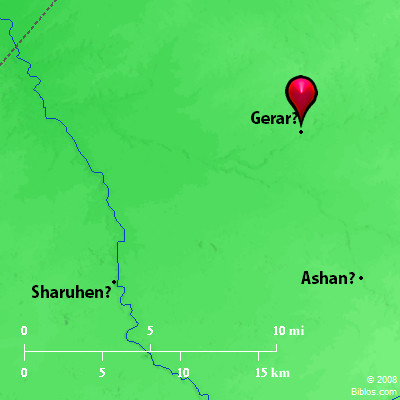Atlas  Gerar and surrounding area Maps Created using Biblemapper 3.0 Additional data from OpenBible.info Occurrences Genesis 10:19 The border of the Canaanites was from Sidon, as you go toward Gerar, to Gaza; as you go toward Sodom, Gomorrah, Admah, and Zeboiim, to Lasha.Genesis 20:1 Abraham traveled from there toward the land of the South, and lived between Kadesh and Shur. He lived as a foreigner in Gerar. Genesis 20:2 Abraham said about Sarah his wife, "She is my sister." Abimelech king of Gerar sent, and took Sarah. Genesis 26:1 There was a famine in the land, besides the first famine that was in the days of Abraham. Isaac went to Abimelech king of the Philistines, to Gerar. Genesis 26:2 Yahweh appeared to him, and said, "Don't go down into Egypt. Live in the land I will tell you about. Genesis 26:6 Isaac lived in Gerar. Genesis 26:20 The herdsmen of Gerar argued with Isaac's herdsmen, saying, "The water is ours." He called the name of the well Esek, because they contended with him. Genesis 26:21 They dug another well, and they argued over that, also. He called its name Sitnah. Genesis 26:26 Then Abimelech went to him from Gerar, and Ahuzzath his friend, and Phicol the captain of his army. 2 Chronicles 14:13 Asa and the people who were with him pursued them to Gerar: and there fell of the Ethiopians so many that they could not recover themselves; for they were destroyed before Yahweh, and before his army; and they carried away very much booty. 2 Chronicles 14:14 They struck all the cities around Gerar; for the fear of Yahweh came on them: and they despoiled all the cities; for there was much spoil in them. Encyclopedia GERARge'-rar (gerar, "circle," "region"; Gerara): A town in the Philistine plain South of Gaza (Genesis 10:19), where both Abraham and Isaac ' sojourned for a time, and where they came into contact with Abimelech, king of Gerar (Genesis 20 and 26, passim). The place has not been fully identified, but the site is probably in one of the branches of Wady Sheri`a, at a place called Um Jerrar, near the coast Southwest of Gaza and 9 miles from it (SWP, III, 389-90). The site answers fairly well to the statements of Eusebius and Jerome, Eusebius, Onomasticon, that it was 25 (Roman) miles South of Eleutheropolis (Beit Jibrin). It is actually 30 English miles, but distances were not very accurately determined in early times. Gerar was known in the first 5 centuries A.D., when it was the seat of a bishopric, and its bishop, Marcian, attended the Council of Chalcedon 451 A.D., It was also the seat of a monastery. GE'RAR, the site of the ancient town is not positively known, but the uninhabited ruins called Umm el Jerrar, 1/2 mile e. of the Wady Ghuzzeh and 6 ms. s. of Gaza, more probably, the ancient site. Strong's Hebrew H1642: Gerara place South of Gaza |



